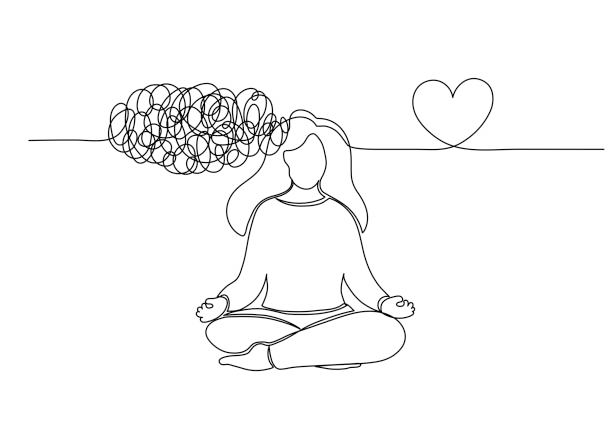When I was in my 20s, a fire broke out on the 9th floor of the Philadelphia office building where I was working on the 2nd floor as a financial advisor. I was already stressed at work, but the fire ignited my stress. As I waited for the Philadelphia fire department to extinguish the fire, I went into paralysis mode; I panicked and wondered about saving my laptop. In my desperation, I asked the fire marshal to let me into an unsafe building to retrieve my precious device. My mind was overcrowded with emotion and I couldn’t access any rational thought, a clear symptom of stress. Yes, I got my laptop. Not only was it unrepairable from the water damage, but I also risked my life for a thing!?
We all understand stress, but what does it really mean? It’s being in a fight, flight, or paralysis mode, a significant portion of your day. The demands of our work exceed our inner resources and we can no longer maintain our equanimity. This describes my own life. It took a dramatic event for me to see the urgency for change. I developed a training program for myself and professionals to make easier and wiser decisions, as well as cultivating a mindset that is less shaken by the volatility of work and life. When our minds are so swamped by demands, we risk creating a mind that’s overcrowded, without much room for new ideas or perspectives.

I have been working with attorneys, as an independent financial advisor, for over 30 years and I’m impressed by the volume of knowledge they have to maintain, the juggling of changing cases and deadlines, the competitive environment, and the necessary communication skills, to be successful. Not surprisingly, being an attorney is the most stressful occupation in the U.S. according to the Washington Post.
What’s the Antidote to Stress? Beginner’s Mind.
An overcrowded mind, like a full cup of tea, has less space for new ideas. The opposite of a cluttered mind, an empty cup, is the Japanese idea of shoshin, which translates to Beginner’s Mind. When I first heard the idea, I didn’t get it, but as I’ve cultivated and shared the Beginner’s Mind idea, it has become a game changer. As we move from a crowded mind to a spacious Beginner’s Mind, we move from stress and a narrow aperture to curiosity and a wide aperture.
Beginner’s Mind is about greeting this moment with a mind of openness and wonder. The practice of shoshin can act as a counter to the hubris and closed-mindedness often associated with thinking of oneself as an expert. My sense is that Beginner’s Mind creates the fertile soil for client insights to emerge. For example, one client decided to move from the Bay area to the Midwest to accelerate financial independence; another asked their kids if they wanted to inherit the family summer home; and another told her parents that she didn’t want any inheritance. I also learned that a client’s stress about a financial or legal matter is sometimes related to a family issue, such as the stress of not living up to the parent’s standards.
Beginner’s Mind is a powerful tool for making any decision, including whether to choose a higher paying law path that might not be the right fit, or how to balance expenses including student debt. Consider the following to start cultivating Beginner’s Mind for yourself.
Intentionally hear your client without past associations and the clutter of your own ideas. Begin to let go of rehearsing your response while another is speaking. It’s listening as if you’re hearing the client for the first time – and it’s bringing curiosity instead of presumptions. You can, however, repeat back what you’ve heard (without exactly parroting it) to make sure you’ve understood them (independent of your filters). For example, if the client says “I’m concerned about …” you might say “I’m curious: tell me more. What might alleviate this concern?”
When we listen with curiosity, we often connect more deeply and even discover something new. This kind of breakthrough lowers our stress; we’re no longer replaying our attorney role; we’re meeting life with freshness. To really get this point, imagine arriving at work and a colleague asks you about a case without any expectation of your answer. Can you sense the spaciousness that might result?
5 Steps for Beginner’s Mind
Declutter the Mind: Before a client interaction, take a 5 min brisk walk or do a mindfulness exercise with the intention of creating a little spaciousness in your mind. Intention is the operative word in that sentence.
Listen with Curiosity: Before beginning a client meeting, remind yourself to listen with curiosity and to let go of any bias. I also remember that the client knows themselves better than I do. As advisors, I have found that we offer clients tremendous value by making them aware of their options – i.e. “Here’s my experience of the pros and cons of doing a 1031 real estate exchange,” and then the client makes their decision. Finally, I remind myself that as a subject matter expert, I can come across as a know-it-all and clients don’t value that as much as we think. This prevents me from pontificating — for 20 minutes, oblivious to what’s important to them.

Collaborate on the agenda: Tell the client, “I have an outline for our meeting today, but tell me if there’s a topic or priority for the agenda.” You’re signaling to the client that you’re receptive to their ideas, even if it wasn’t on the agenda. I also want to honor what they think is most important.
Train: Just as you do many reps at the gym, be willing to do many reps of noticing the moment you catch yourself rehearsing your response or finishing your client’s sentences as they’re speaking. Beginner’s Mind is an open, uncluttered mind, the opposite of a mind busy rehearsing. Just kindly recognizing, and interrupting the pattern, starts to diminish future rehearsing.
Ask questions: Ask questions that help the client get to their own answers. When the client does ask a question, offer a brief answer and ask if they want more. Remind yourself during the meeting to listen with a sense of wonder. There’s a well-respected meditation teacher from India, Nisargadatta, who said “knowing more is a path to ignorance and not knowing is a path to wisdom.” As we mature in our professions, we realize that there is so much nuance in how a client talks about retirement, for example. The more we can listen with an uncluttered mind and hear that nuance, the more likely the client will trust us to share beyond what they might normally share.
Mind Skills for Making Wise Decisions
According to Eva Krockow, professor of psychology at the University of Leicester, your brain is making more than 35,000 decisions per day, or over 12 million per year – that sounds stressful! That mind-boggling statistic was the catalyst for me to investigate how we, as advisors, can make less stressful and wiser decisions and how we can guide our clients to do the same. Yes – this is a trainable skill! – and we have at least 35,000 opportunities everyday to get better and help our clients, so let’s get started!
- Cultivate Objectivity. Wise decision making depends, in part, on our ability to keep our emotions and fixed beliefs in check. One simple way to access greater objectivity is to ask yourself (or your client): how would you advise a colleague or friend with the same challenge? The more often you do this, the more you train your brain to access objectivity and the less you strengthen your biases. My clients and I love this exercise. I have come to see that clients really value advisors who empower them to make their own life decisions. When clients feel our increased objectivity over time, they naturally want to follow our modeling and be more objective themselves. Another way to increase objectivity is to recognize your pervading money beliefs and/or biases. For example, I have a belief that people should leave enough (but not too much) to their heirs. When I recognize my bias, I can compensate for it. One way I do that is by listening with a Beginner’s Mind to really hear their compelling reasons. I also ask myself: what if I listen to this client as an advisor who believes clients should leave all their money to their heirs?
- Give Yourself Time. I have often made poor decisions because I created an artificial deadline. Now, I find out when a decision is actually due, so that I don’t assume a date. I also allow 24 hours before responding to an upsetting email, because I’ve learned that replying impulsively, in the heat of the moment, usually isn’t necessary or wise. Many times, the situation gets resolved before I even need to reply. With more time, our emotions are more likely to settle and less likely to result in an impulsive decision that we’ll regret.
- Cultivate an Enough Mindset. This is a subtle but profound idea. When we’re feeling a sense of scarcity in terms of our success, our brains function less optimally. The first step in cultivating a mindset of Enoughness is to recognize our bias towards seeing that which is missing (the negative), rather than seeing what we already have. The more we train our brain to see that we’re enough as we are, the more likely we are to see the opportunities for growth. A simple practice of noticing one thing that you appreciate about yourself and a client, can help you move to this mindset of enough. Our minds naturally let go of tension, we stop over-striving, and ironically, we experience more sustainable success.
- Gain Intelligence. When thinking through a decision, seek out feedback from people with diverse points of view. One of the mistakes I’ve made, for example, is not seeking enough feedback from my operations team before offering a new service. That’s also why our experience about what worked and didn’t for past clients is so valuable. I also encourage my clients to have a zoom call with all of their advisors before making big decisions.
- Review. Recall your biggest decisions over the past 5 -10 years. Look back and recognize what went well and what didn’t, making sure to include successful decisions too! What are you learning about yourself?
The best part about training your decision-making skills is that it can be really fun. Many legal professionals attending my Mindful Advisor programs have found this to be one of the best things they have done for their mental health, practice, and client relations. The qualities of Beginner’s Mind and an Enough mindset won’t just make you a better decision maker, they’ll help you distinguish your practice and offer clients your most valuable asset — your presence.
SHARE THIS POST
The road to financial freedom is easier when you share the journey. By signing up for Spencer’s newsletter, you’re joining a growing community of people who’ve found their way to “Enough.”





